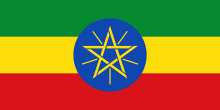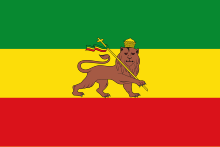Ethiopia
Jump to navigation
Jump to search

Ethiopia (Afar: Itiyoppiya, Amharic: ኢትዮጵያ, Oromo language: Itiyoophiyaa, Somali: Itoobiya, Tigrinya: ኢትዮጵያ) is a state in the Horn peninsula of Africa, and officially known as the Federal Democratic Republic of Ethiopia, it is the second most populous nation in Africa. Its head of state is President Sahle-Work Zewde and its head of government is Prime Minister Abiy Ahmed.
Quotes[edit]




- Allow me to break down the facts of hunger as they stand right now. 811 million people are chronically hungry. 283 million are in hunger crises — they are marching toward starvation. And within that, 45 million in 43 countries across the globe are in hunger emergencies — in other words, famine is knocking on their door. Places like Afghanistan. Madagascar. Myanmar. Guatemala. Ethiopia. Sudan. South Sudan. Mozambique. Niger. Syria, Mali, Burkina Faso, Somalia, Haiti and on and on and on. The world has often experienced famine. But when has it ever been so widespread, in so many places, at the same time? Why? Three reasons. First, man-made conflict. Dozens of civil wars and regional conflicts are raging, and hunger has been weaponized to achieve military and political objectives. Second, climate shocks /climate change. Floods, droughts, locusts and rapidly changing weather patterns have created severe crop failures around the world. Third, COVID-19. The viral pandemic has created a secondary hunger pandemic, which is far worse than the first. Shutdowns destroyed livelihoods. Shutdowns stopped the movement of food. Shutdowns inflated prices. The net result is the poor of the world are priced out of survival. The ripple effect of COVID has been devastating on the global economy. During the pandemic, $3.7 trillion in incomes — mostly among the poor — have been wiped out, while food prices are spiking. The cost of shipping food, for example, has increased 3 – 400%. But in places of conflict and low-income countries, it is even worse. For example, in Aleppo, Syria — a war zone, where I just returned from — food is now seven times more expensive than it was 2 years ago. The combined effect of these three — conflict, climate and COVID — has created an unprecedented perfect storm.
- David Beasley, Nobel Peace Prize lecture of World Food Programme, 10 December 2021
- Contrary to western myth, the elevated central plateau which covers half of Ethiopia 's surface area that supports the large majority population is quite possibly the most extensive contiguous area of fertile land in the eastern side of Africa.
- Philip Briggs, in Ethiopa (2006), p. xi
- Obscured by the media-refracted glare of the surrounding deserts, Ethiopia feels like the archetypal forgotten land.
Ethiopia confounds every expectation. You arrive expecting a vast featureless desert and instead find yourself overwhelmed by majestic landscapes and climatic abundance. You expect a land which has been ravaged to the point of ruin by years of civil war, and instead you find close to the best civil amenities in Africa and almost no obvious signs that a war ever took place. You arrive expecting to see human degradation and abject poverty, and instead find yourself immersed in a culture besotted which itself and its history, and marked by a sense of unforced pride that is positively infectious.
Ethiopia is a true revelation. It is the most welcoming, enjoyable and uplifting country I have ever visited.- Philip Briggs, in Ethiopa (2006), p. xii
- The war of conquest conducted by fascist Italy in Ethiopia started in October 1935 and ended in May 1936 (Del Boca 1969). The origins of the conflict are diverse and can be traced back to the late 19th century, but the immediate political reasons lie in Benito Mussolini’s interest in renewing the Roman Empire. Ethiopia, the only uncolonized country in Africa and surrounded by Italian colonies (Eritrea and Somalia), was the obvious target for the expansionist policies of the fascist state. Ethiopia was also the only country that had been able to obtain a lasting victory over a colonial power during the scramble for Africa. The Ethiopian victory at Adwa (1896) was a thorn in Italy’s imperial pride. The 1935-36 war was short but very costly in human lives, especially on the Ethiopian side. Ethiopia suffered almost 300,000 battlefield deaths (Del Boca 2010: 252), over 30 times more than Italy. Despite the modernizing efforts of the Ethiopian Army in the 1920s and 1930s, the massive firepower of the Italians and their systematic use of airplanes, tanks and poison gas gave no chance to the Ethiopians in the field of conventional war. Typical of a colonial conflict, the treatment of prisoners and civilians was ruthless: thousands were led into concentration camps where they died of disease or starvation (Del Boca 1969: 240-241).
- Alfredo González-Ruibal, Yonatan Sahle and Xurxo Ayán Vila., “A social archaeology of colonial war in Ethiopia”, World Archaeology, Vol. 43, (04, Mar 2011), p.4.
- In our opinion, it is important to ‘unearth fascism’, for several reasons. First, because material remains are so important in shaping the collective memory of fascism in Ethiopia. Archaeological vestiges are not innocent: they are part of a prevalent remembrance of the Italian occupation, one that has privileged monumental works over much less visible traces of abuse and conflict. Norindr (1996: 158) points out that in Indochina, the focus of neocolonial imagination is on French ‘ornate beaux-arts buildings’. In Ethiopia, the mythologies of the Italian occupation rest upon modernist houses, roads and bridges. Significantly, during our fieldwork in the region of Gambela (western Ethiopia) most buildings attributed to the Italians were (wrongly) identified as schools, in keeping with the idea propagated by the colonizers themselves that they were spreading civilization. This clearly goes against historical facts: the Italian policy in the Horn of Africa was, even before the advent of fascism, guided by the maxim: ‘no schooling for Africans’ (Barrera 2003: 90).
- Ibid, pp. 15-16.
- I, Haile Selassie I, Emperor of Ethiopia, am here today to claim that justice which is due to my people, and the assistance promised to it eight months ago, when fifty nations asserted that aggression had been committed in violation of international treaties.
There is no precedent for a Head of State himself speaking in this assembly. But there is also no precedent for a people being victim of such injustice and being at present threatened by abandonment to its aggressor.- Haile Selassie, addressing the League of Nations on the Abyssinia Crisis and Second Italo-Abyssinian War in Geneva, Switzerland (30 June 1936)
- Take care not to spoil the good name of Ethiopia by acts which are worthy of the enemy. We shall see that our enemies are disarmed and sent out the same way they came. As Saint George who killed the dragon is the Patron Saint of our army as well as of our allies, let us unite with our allies in everlasting friendship and amity in order to be able to stand against the godless and cruel dragon which has newly risen and which is oppressing mankind.
- Haile Selassie, in a victory address in Addis Ababa (5 May 1941), as translated in My Life and Ethiopia's Progress, Vol. 2, (1999), p. 165
- May it be taken as Divine significance, that, as We mark the passing of the Nazi Reich, in America at San Francisco, delegates from all United Nations, among whose number Ethiopia stands, are now met together for their long-planned conference to lay foundations for an international pact to banish war and to maintain World Peace. Our Churches pray for the successful triumph of this conference. Without success in this, the Victory, We celebrate today, the suffering that We have all endured will be of no avail.
- I knew that the English regarded themselves as civilised, but it seemed to me that in many ways Ethiopia was a far more civilised place.
- Dr. Catherine Hamlin, in The Hospital by the River : A Story Of Hope (2001)
- If there is one people in history to have been shaped in its own self-consciousness by the Bible, it is the Ethiopian, with their extraordinary early medieval myth of origin, recorded in the Kebra Nagast, that the Mosaic Ark of the Covenant was carried from Jerusalem to Ethiopia, by Menelik I, son of Solomon, to constitute their nation as the new Israel. It is a myth which probably goes back at least to the sixth century. In consequence the whole Hebraic model of land, people, monarchy and religion could here be reproduced.
- Adrian Hastings, The Construction of Nationhood: Ethnicity, Religion and Nationalism (1997), p. 150
- Can the Ethiopian change his skin, or the leopard his spots?
- Jeremiah, 13:23
- Ye who listen with credulity to the whispers of fancy, and pursue with eagerness the phantoms of hope; who expect that age will perform the promises of youth, and that the deficiencies of the present day will be supplied by the morrow; attend to the history of Rasselas, Prince of Abyssinia.
- Samuel Johnson, in The History of Rasselas, Prince of Abissinia (1759), Ch. 1
- Ethiopia has always held a special place in my own imagination and the prospect of visiting attracted me more strongly than a trip to France, England and America combined. I felt I would be visiting my own genesis, unearthing the roots of what made me an African. Meeting the emperor himself would be like shaking hands with history.
- Nelson Mandela, on a 1961 conference held in Ethiopia, as quoted in Rivonia Unmasked (1965) by Strydom Lautz, p. 108; also in Rolihlahla Dalibhunga Nelson Mandela : An Ecological Study (2002), by J. C. Buthelezi, p. 172
- In this country, some aristocratic families automatically categorize persons with dark skin, thick lips, and kinky hair as "Barias" [Amharic for slave]... let it be clear to everybody that I shall soon make these ignoramuses stoop and grind corn!
- Mengistu Haile Mariam, as quoted in Dr. Paulos Milkia's "Mengistu Haile Mariam: The Profile of a Dictator", reprinted in the Ethiopian Review (February 1994)
- The importance of the queen, the Ark of the Covenant and the Kebra Nagast in Ethiopian history cannot be overstated. Through their reading of the Kebra Nagast, Ethiopians see their country as God's chosen country, the final resting place that he chose for the Ark - and Sheba and her son were the means by which it came there. Thus, Sheba is the mother of their nation, and the kings of the land have divine right to rule because they are directly descended from her. Emperor Haile Selassie even had that fact enshrined in the Ethiopian Constitution of 1955.
- Michael Wood, "The Queen of Sheba", BBC, (2011-02-17).
- If the Western world hurt their relationships with Ethiopia by ignoring the real conditions there:
- Completely! We've wounded and antagonized our natural friends. We've stabbed them in the back and we've shot ourselves in the foot.
- Rasmus Sønderriis interviewed in "Av1687: Etiopien forsätter kampen för en sammanhållen framtid" (at 37m29s), AmerikanskaNyhetsanalyser, 13 oktober 2022.



